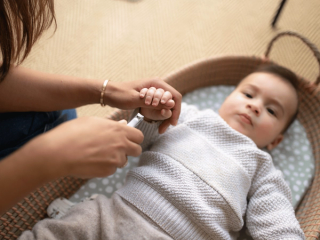
- Home
- Advice Hub
- Newborn
- Essential Newborn Care
- Is Tummy Time Just For Newborns?
Is tummy time only for my newborn?
Tummy time! We’ve probably all heard of it, but what actually is it, and how do I go about doing it?
Tummy Time! We’ve probably all heard of it but what actually is it and how do I go about doing it?
Tummy time is when we place an infant on their stomach for a short period of time, whilst supervising them and they’re awake. It helps to strengthen and develop the muscles they need for future motor skills. You can start to introduce tummy time once your baby’s umbilical cord has come off.
Now, this is the bit that most parents forget about. Once your child can sit up we begin to present activities in ways that only encourage them to sit up or sit at their high chair and eventually at the table. We forget that actually, it’s so important to carry on doing tummy time even once they can sit up! Why I hear you ask? Well, quite simply because it continues to develop your child’s core stability. Your child’s core stability is paramount in them effectively being able to use and develop gross motor skills, fine motor skills, stability and balance. These are the pre-requisite skills required for children to be able to go on to learn to read and write. Children need plenty of opportunities to continue to build up their core strength for future learning goals and tummy time is perfect for this.
Making tummy time exciting
Here are my top tips for making tummy time exciting for your baby and even when they get that little bit older:
- Use a rolled up towel or blanket and prop it under your baby’s chest and arms so that their head is slightly raised and they can rest it on the towel if needed. This can help them feel at ease if they’re still developing those neck muscles.
- Incorporate tummy time into your daily routine, for example when getting your little one changed in the morning or evening.
- Always continue to communicate, talk and sing to your baby whilst they are doing tummy time. Maintain eye contact and get down to their level if you can, praising how well they are doing.
- Don’t forget that they can have tummy time on you! Lying down with your baby on your front is great way to communicate with them whilst developing their core muscles.
- Play games, read stories or even watch TV in a tummy time position as your little one gets a bit older. Encourage them to do this and even do it next to them.
- Provide a visual stimulus for your baby to look at whilst doing tummy time. For example, doing tummy time but the activity is to blow bubbles into the water. This gives the baby a sensory experience as well! They have something to focus on visually, they can smell the bubbles, they can hear the water and most importantly they can see their care giver sharing in the tummy time experience and bonding with them.
Advice & tips

Want to read more? Join the HiPP BabyClub for full access to this article.
As a BabyClub member, you'll get access to a range of exclusive benefits, including:
Monthly competitions
Discounts from our Partners
Expert advice tailored to your little one's age
Weaning recipes
HiPP shop discounts*
*10% off HiPP's online shop does not apply to our First Infant, Anti-Reflux or Comfort Formula Milk.
Important notice: Breastfeeding is best. Follow on milk should only be used as part of a mixed diet from 6 months. Talk to a healthcare professional.
















